Postcard From Moscow
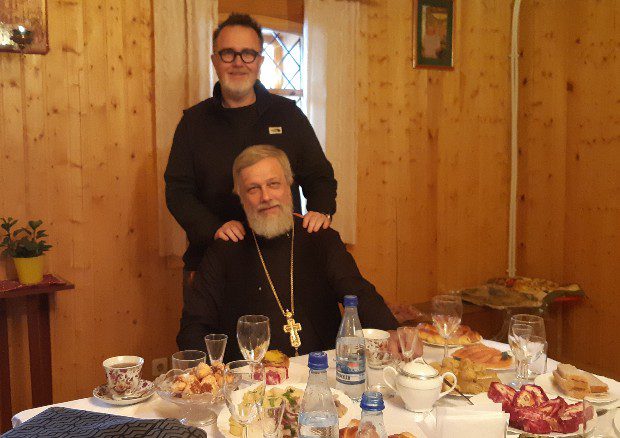
So, I made it to Russia. Landed in Moscow from Helsinki, and was set upon by a swarm of vultures disguised as taxi drivers. Ha ha, you fiends, I’m not going to be taken in by you! I know how you work. I’m going to march over here to the proper taxi stand and get a real taxi.
The guy at the stand told me that all the drivers standing around are reputable, and that I could trust them. Well, okay, if you say so.
Of course they cheated me, charging me more than three times what the right fee from Sheremeteyvo airport to the city center should be. But I had already paid the flat fee after they put my bags in the car, and I more or less had no choice. Fortunately I had the good sense to pay for it with a VISA card. Once I got to my hotel and found out how badly I had been cheated by those snakes, I called VISA and got them to put a stop payment on the charge. I trust that that will happen. Later, I found out from a friend that I had done the right thing, but the young man working the taxi counter must have been taking a kickback from the thieving taxi drivers. It was not a good start to my Moscow trip. I tell you that as a warning.
Too bad, because this is an astonishing city. I had not imagined how massive Moscow is. We drove forever to get to my hotel, which is near the Kremlin. After I got settled, I met my friends Dmitry and Andrei, both theologians, and we paid a visit to Vladimir Legoyda, the communications chief for the Moscow Patriarchate. He is a fan of The Benedict Option, as it turns out, and wanted to meet. We drank tea with Legoyda at his office inside a monastery, then went to a Georgian restaurant for dinner. I could show you a lovely View From Your Table, but I haven’t been able to figure out how to make this new camera I bought work for sending photos to my laptop.
This morning I had breakfast at the hotel, then met my translator and guide, Matthew Casserly. He’s a young American who has been living and working in Moscow for seven years, and is also a convert to Orthodox Christianity. We went into the metro, which is every bit as astonishing a place as you’ve heard. Matthew said he has no good words for the Bolsheviks, except that they built a glorious subway system. And that they did.
We headed out to the far southern edge of Moscow, and then caught a bus for even further out. Our destination was the Church of the New Martyrs and Confessors of Russia, a sanctuary built next to a Stalinist killing field sometimes called the Russian Golgotha. In the field, called the Butovo firing range, the Communists murdered 21,000 political prisoners in a 14-month period between 1937 and 1938, at the height of Stalin’s Great Terror. They buried their bodies there. At least 1,000 of them are known to have been martyred for their Orthodox faith. The nearby church glorifies not only them, but all those murdered by the Bolsheviks — including the Romanov family.
Please read this to learn the full story of the killing field, which was turned into a mass grave. You can also see the tiny wooden chapel on the field, dedicated to the martyrs made there. Across an asphalt road is the big white church, where Matthew and I lit candles.
Yesterday, October 30, was in Russia a national holiday: the Day of Remembrance of those killed in political repressions.
When Matthew and I finally arrived at the big white New Martyrs church, the liturgy of commemoration had ended, and worshipers had migrated into the field surrounded by woods to stand in the wet snow and take turns reading aloud the names of those murdered there. It would take them many hours.
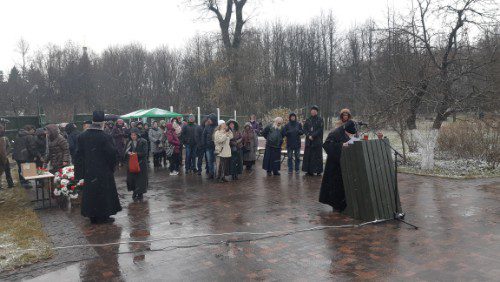
Beyond them was a long rectangular walk, modeled in part on the Vietnam War Memorial in Washington, DC. You pass along a granite wall on which you see the names of all those murdered on that field in a particular month. In the grassy area surrounded by the path are some mugshots of some prisoners who were later shot there. The eyes of these men and women say everything: calm resignation in some; defiance in others; disbelief that this is how one’s life is going to end, and so forth.
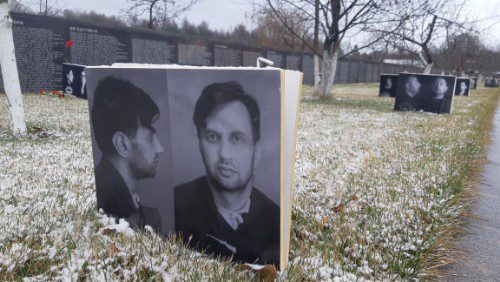
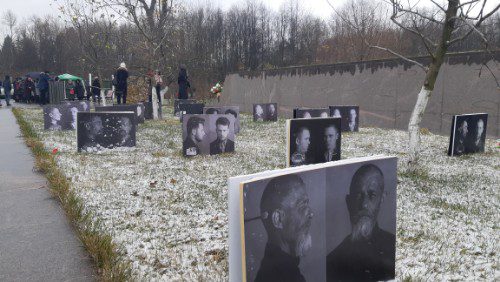
Standing at an exhibit at the edge of the field, looking at a tally of the number of dead killed each day, a Russian man struck up a conversation with us. He was there because his grandfather had been murdered by Stalin for telling people on the collective farm where he lived and worked to save their own houses in a fire, not the farm. Someone told the authorities, and that was the end of Vladimir Alexandrovich’s grandfather. On this spot they killed the priest of his church back then, and also the man who held the door at the church.
“And for what?” said Vladimir Alexandrovich, not expecting an answer.
Speaking to him in Russian, Matthew told him what my new book was about. When I told him that people are losing their jobs in the US over political issues, he said, “That’s a bad sign.”
“History always repeats, one way or another,” he said, heavily.
The wind picked up, and it was snowing harder. Matt and I found a military mess tent with a men ladling hot sugary tea into cups and buckwheat kasha into bowls for pilgrims. A stout, cheerful babushka stood guard over the buns: a box full of cabbage-stuffed buns, and a box of apple-filled. She coached us men sitting there shivering in the tent to eat more.
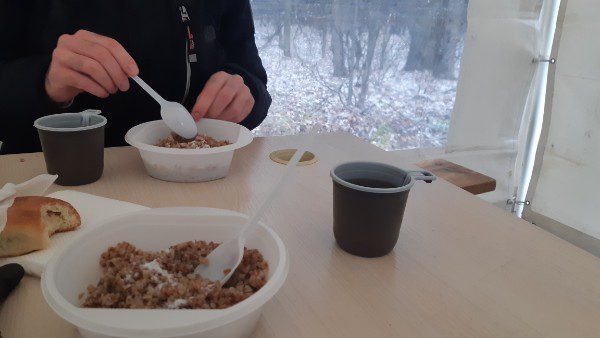
After our lunch, Father Kirill Kaleda, the archpriest of the big church across the road, and the man most responsible for turning this killing field into a memorial site, invited us to come into the log cabin where his office was, and they met pilgrims. As you can see above, his table was laden with food on this day, in case anyone came for lunch.
Father had just returned from a local school, where he met with students to tell them what happened at Butovo. I mentioned to him that Vladimir Alexandrovich told us how much he worries for the future because so few young Russians know or care about history.
“Unfortunately, he’s right. I can clearly see that the young people I was talking to today know nothing about what happened here. When I started talking about very simple things, I could see they knew nothing. So yes, there is a danger that in some form, there will be a repetition.”
We were sitting at a table in a log cabin that served as Father’s office and the church’s reception house. The table was laden with wine, salmon, herring, cheeses, and blini, all to serve visitors who came by throughout this special day. I noticed two cars with diplomatic plates from former communist countries parked outside.
In terms of protecting liberty, Father Kirill said that the most important thing to talk about is the free access to information, and the freedom to have an opinion about your nation’s history.
“It’s limited here, and I hear that it’s limited in the US,” he said. “This ability to have a different opinion is so important.
“It’s not only about having an opinion about one’s historic past, but it’s also about the idea of what is right. It seems to me out of place and unacceptable that America has the idea that what it does is right, and there’s no room for that to be challenged.”
I told him about some things that are happening in America, with regard to the suppression of speech on college campuses, and people like Dr. Allen Josephson being fired for speaking their minds.
“What kind of freedom are you talking about, then?” he said drily. “People have a right to make errors, including ideological errors. But if somebody is limiting somebody else’s freedom simply to have an opinion, we can already call that unfreedom.”
We spoke about gender ideology, which he said that most Christians and Muslims will see as “unacceptable, because there is no natural basis for it.”
“Obviously these phenomenon have existed historically,” Father Kirill said. “The thing that has changed now is people are trying to say that it’s good. This is the battle in front of us now: maintaining the distinction between good and evil.”
But how to resist? We spoke of political combat. I don’t think Father Kirill had heard of The Benedict Option, but I told him about my frustration with American Christians who think the best and only way to fight these things is by electing politicians who will put the right judges onto the court.
He seemed to agree.
“The most correct way and the most productive way of battling has to be in your own world, that you can effect,” he said. “Not everybody can share their opinions with large number of people, but the way your living your own life, your insistence on having your own opinion, and more importantly the way you’re running your own family, this is more available to ordinary people. What did St. Seraphim of Sarov say: ‘Acquire the Holy Spirit and thousands around you will be saved.’ That is the best way. In fact, this path of podvig [a feat, a deed] is the one chosen by the faithful of the Russian Orthodox Church even in the middle of the most horrible persecutions.”
In the future, when Americans ask me what use the Benedict Option would be in a time of persecution, I will remind them of what the priest who serves a church named for the martyrs of the Bolsheviks said. He went on:
When thinking about this topic, it’s important not to be limited to just the canonized saints. What’s more significant is what in Russia we call the white headscarves — usually women, simple women with low education levels, who continued to go to church no matter what the conditions were. They were able to save something, and pass it on to their children. We can’t lose sight of these. There were so many of them.
One can be tempted to think that they performed no holy feats, that they just went to church. But in fact they were the ones that saved the faith and were able to preserve the church.
As he spoke, I looked behind his shoulder, through the window where snow was falling on a field where 21,000 men and women met their deaths, and were buried in a mass grave. It added weight and depth to the priest’s words.
Father Kirill continued to speak of the personal responsibility every Christian has for the space around him. He emphasized that believers can’t wait for great leaders to emerge to set things aright. Doing so is a way of avoiding responsibility for mastering the small spaces in which we ourselves live. “Out of these small spaces, that is what society is built of,” he said.
He spoke of a second-century saint who had a mystical vision:
He was shown the construction of a tower. When they were building tower in his vision, people brought stones. Some of them were perfect, and could put right into the construction. Others needed only a little bit of work. Others had to be thrown out. The angel who showed him this vision told him this tower is the church: a buillding that is being constructed throughout the course of human history. Each one of the stones is an individual member of the church. Those that spend their lives getting ready to be a part of the structure, they were able to be put right in by the builder. The history of the construction of this tower is the history of the construction of the church, and that is the history of humanity. The story of this construction is also the story of these people. The history of this tower is the history of these individual people — not of wars, not of church councils, not of a certain bishop occupying a certain position, that’s not what this tower is made of. So, the story of humanity is the story of individual people, not the story of presidents.
I told Father Kirill that the rise of identity politics seemed to me a worrying sign. The American left is training its people to regard others only in terms of their group identities, and to regard some groups as evil oppressors, and others as virtuous victims, simply by virtue of their group membership. How can we resist that? I asked.
“Here the most important thing is maintaining simple human contract, making sure that people have contact with each other,” said the priest. “This is made clear by the people who come here to Butuvo. They arrive with all kinds of opinions about what happened here, and about our country’s past. From their conversations, you can see a new relationship is being built, maybe even a brotherhood. It’s not that everybody changes their opinions, but the weight of what happened here begins to break down barriers. The most important thing is to see a humanity in others.”
I raised Solzhenitsyn’s injunction to the Soviet people to “live not by lies.” How, I asked, does an honest man live in a society where lying is a way of life?
“With difficulty!” he said, laughing.
“Of course it’s difficult, but thanks be to God, there were people who were doing their best to build their lives in such a way that they could live in truth,” he continued. Of course people understood that if living in truth was going to be a priority, they were going to have to limit themselves in other ways — the progress of their careers, for example. But they made a choice, and resolved to live by it.”
Born in Moscow in 1958, Father Kirill grew up as one of six children in a practicing Orthodox family. None of them joined the Communist Youth League, the Komsomol.
“When I was a teenager, I wanted to study history,” he said. “My father explained to me that in the Soviet world, trying to be involved with studying history and not be involved with Soviet ideology, is impossible. So I became a geologist.”
Many families opposed to the Bolshevik regime sent their children into the natural sciences to avoid the taint of ideology as much as possible.
Then I asked him what his experience growing up in the Soviet Union taught him about the importance of understanding how propaganda works. He emphasized that propaganda did not end when the Soviets fell.
Today things are slightly different because people have access to more information. Despite the fact that there’s so much information available, we see that so much propaganda is also available. Think of what’s happening now with Ukraine. These people are our relatives. We have seen the way TV changed us Russians from thinking of them as our family to being our enemies. The same methods from the communist era are being used. People today have a responsibility to search out more information than what they are offered on TV, and to know how to look critically on what they’re reading and seeing. That’s what is different now than before.
I told Father Kirill that I was not worried about totalitarianism coming in the form of Stalin 2.0. I do not expect the killing fields of Butovo to return. But I do fear the gradual and profound loss of human freedom in a soft way: people willingly handing over control of their thoughts, their actions, and their lives out of fear of suffering — even suffering inconvenience. I told him about my Millennial friend in Budapest, and her testimony about how members of her generation are driven by the maximization of “well being” — which, in their case, means avoiding any kind of suffering, no matter what the cost.
The priest thought hard before answering. Then he said:
Christ said that his followers should be ready to pick up their cross and carry it at all times. Taking up your cross and carrying it is always going to be uncomfortable. We can say clearly that this current ideology of comfort is anti-Christian in its very essence. But we should point out the fact that the Church, not once, ever call its followers to look for suffering, and even made it clear that they were warning not to do that. But if a person finds himself in a situation where he’s suffering, then he should bear it with courage.
Every person in his life goes through some kind of test, through different kinds of difficulties. People that are accustomed to living in some kind of comfort, not only in a typical household way, but even in a spiritual way, then they are not able to bear these trials. The memory of a Russian saint who lived at the beginning of the 20th century, Father Alexei Michev comes to mind. Where did everything begin for him? He served in a small, poor church in the center of Moscow because of the fact of where their house was in this church, it was a raw, unheated space. His wife got tuberculosis and died, leaving him with a young son. In the Orthodox Church, you can’t marry a second time if you’re a priest, so he was in despair. He met with Father John of Kronstadt, now St. John of Kronstadt, who said to him, “What are you doing walking around grieving all the time? Look around you. Look at how much grief everyone around you has? Take that grief upon yourself, and when you take their grief upon yourself, you’ll feel that your grief is smaller. And he fulfilled the words of St. John.
Father Alexey Michev died in old age. His son Sergey was also an Orthodox priest — one who was martyred by the Bolsheviks. Here is their story from a Russian Orthodox website. Notice what it says about St. Sergey, whose name and story was unknown to me before Father Kirill brought it up:
Fr. Sergius entered the ranks of Russia’s New Martyrs for his uncompromising stand in ecclesial matters. His principal renown, however, rests upon his pastoral skills. The Maroseyka parish was unique in Moscow in cultivating an inwardly monastic orientation. Fr. Alexey often said that his task was to create “a monastery in the world,” by which he meant a parish family guided towards the same goal of sanctity and deification as the monastic.
Fr. Sergius held the same principle although later on he stopped speaking of it as a “monastery in the world,” because others had adopted this term as meaning some kind of community of secret monks or nuns who lived in the world while under obedience to monastic vows. Instead, Fr. Sergius took from ancient Russian church practice the term “repenting family.” He also referred to his parish as a “repenting-liturgical family.” It was very apt. As a spiritual director, he strove to cultivate in his flock a spirit of repentance and he encouraged frequent attendance at church services, which he considered to be the best school for the development of spiritual life.
My God. This martyr-priest, Father Sergey Michev, was living what I call the Benedict Option, and leading his parish that way. I will look for an icon of him today while I am in Moscow.
I asked Father Kirill what his message is for American churches. He said:
What happened in the 20th century in Russia serves as witness to the fact that many Russian people not only believed in God, but they also entrusted themselves to God. For them, the spiritual world and the kingdom of heaven were a reality. Despite the fact that for them, because of their own human weaknesses, it was a scary and painful time. Their podvig is the witness to the existence of another world, a spiritual world, and the Kingdom of Heaven. The lesson for us are the values of this earthly life, including our comfort, are nothing in comparison to the value of the Kingdom of Heaven. But this is a very difficult lesson.
What he meant was that it is not enough to say that we believe. We have to cultivate deep faith in the reality of God’s kingdom, and live it out. There is no other way.
As Matthew and I put on our coats to leave, Father Kirill called us into his office. There he showed us the mitre of St. Alexey. We both crossed ourselves and kissed this precious relic.
Russia! What a country. I have more to say about who I met yesterday and what we talked about, but I have to go out into the city now. I’ll blog more later tonight.
Let me add that it is cold, cold, cold here. Napoleon got what he deserved. I am thinking about the time I saw, in the military museum in Paris, the coat Napoleon wore on his disastrous winter siege of Moscow. It was made of cloth. Russia’s winter mocked him bitterly. Moscow isn’t even in winter yet, and it’s mocking this Louisiana boy bitterly. I feel as if I’ve had a full winter, and it was only my first day.
Subscribe for as little as $5/mo to start commenting on Rod’s blog.